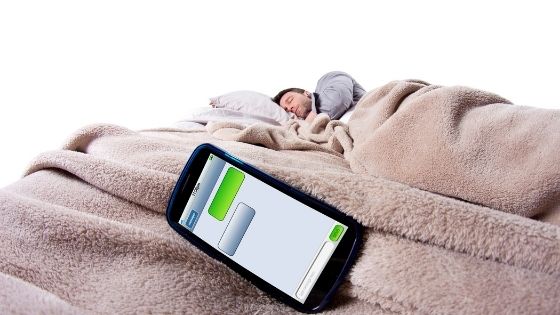Today it is almost impossible to imagine a life without a mobile phone. We always have it with us, we never turn it off. We even go to sleep by keeping it on the bedside table. But won’t it hurt to sleep next to your cell phone?
Read on to find out if the habit of keeping your phone always at hand isn’t actually a habit that can harm your health. Find out all about the damage caused by sleeping next to your cell phone.


Why is sleeping near my cell phone dangerous?
If you are among the thousands of people who sleep with their phones next to their bed, this could cause you numerous (currently unnoticeable) health problems. The radiation emanating from smartphones is really dangerous and not at all advisable.
It is like this at any time of the day. However, during the hours of sleep they can cause nightmares, prevent us from falling asleep easily, make us wake up several times every night, etc. The reason? An alteration in the self-regulation system of some processes, such as, for example, that of the biological clock or circadian rhythms.
The World Health Organization says electrical appliances in general (not just cell phones) are harmful to the body and can increase the chance of suffering from cancer.
While some scholars don’t recognize its toxic effects, what you need to know is that phones rely on ionizing radiation and wavelengths.
Research conducted in Australia has shown that there is an important correlation between smartphone use and men’s sterility. Not only that, a reduction in sperm quality and an increase in stress in both sexes have also been associated with the use of smartphones.
During the night you have to turn off your mobile phone because, even if we don’t use it, it still emits radio bases or radio frequencies.
This means that mobile phones emit electromagnetic waves into the surrounding environment even when they are in standby, not just when they are used. Therefore, sleeping next to the cell phone means being hit by these waves that are not good for us.
Sleeping close to the cell phone is harmful because the body and in particular the head are exposed to radio frequencies. To block harmful EMF radiations that adversely affect our health, it is important to put an EMF blocking device on your cell phone. One such device is SmartDot. This magnetic disc retunes EMFs back to their source so they are no longer harmful to the human body. If you want to know more about this useful device, refer to this this guide here.
Where to leave your cell phone when you sleep?
There are two options: the first is to turn it off and leave it in its usual place (on the bedside table). The second is to leave it on, but in a distant room, such as the kitchen or living room.
However, this alternative is less recommendable. It is normal for you not to feel comfortable about turning off your cell phone. In an emergency, in fact, you would not be reachable if someone wanted to get in touch with you.
However, you can at least disconnect the data or the connection to the Wi-Fi network, which is more dangerous than radio frequencies.
Experts say the cell phone must be at least one meter away from our body when we sleep. You can leave it, for example, on the sofa or chair.
Other risks related to sleeping near the cell phone at night
Another factor to take into account, and which many do, is that you cannot leave your cell phone charging overnight while keeping it under your pillow.
There are many cases of people who have burned their faces or hands as a result of a current overload and subsequent fire of the device.
Pillows are made of a material that easily ignites and this puts us in danger while we sleep, when we are not aware of what is happening around us.
Another of the risks associated with leaving the cell phone on the bedside table during the night is the increase in our anxiety levels. We are alert and attentive all the time, we wake up in the middle of the night to check our mail or social networks every time we get a notification, etc.
It is a change in behavior and habits that in the long run leads to stress, insomnia, lack of concentration, cognitive problems, lack of productivity, short temper, nightmares, headaches, etc.
Other “healthier” habits when using your cell phone
- Prefer short calls and if they last too long, change ears every few minutes.
- As far as possible, make phone calls using a headset so as not to hold the mobile phone close to the head.
- Avoid that children use the mobile phone, not even as a game.
- Do not talk on your cell phone when there is little network, as the device will have to emit more powerful radio frequencies.
- Do not keep the mobile phone close to the body (especially for men who put it in their trouser pocket), or in contact with the skin.
- Keep it away, even if it is half a meter on our desk or table.
If you want to find your location through your phone please check this website.
Having said that, let’s let the cell phone rest, let’s get rid of it for a while! During the night, we must only think about sleeping and resting. Sleep and rest serve us to recharge the batteries we have used up during the day.
The cell phone is best left off until we wake up (if we can’t resist any longer) or when we leave the house to go to work.
In this way, we will avoid imbalances on the neuronal level, as regards the quality of sleep and the levels of stress. The results of the studies in this regard are still not completely clear, even if the data we already have at our disposal alarm us.
Also, don’t forget that other electrical appliances in your home can also be harmful to your health. Try not to keep the television and computer in the bedroom.
If you already have them, you can unplug them before going to sleep, for example. Turn off the router when you go to sleep and try not to use your cell phone until the last moment before closing your eyes.
Conclusion
In the world we live in, the use of mobile phones is increasingly essential, to the point that we never leave it. We take it to any place we go and if we forget it, we feel lost. But are we sure it’s good to always have your phone close at hand, even when we sleep?
















